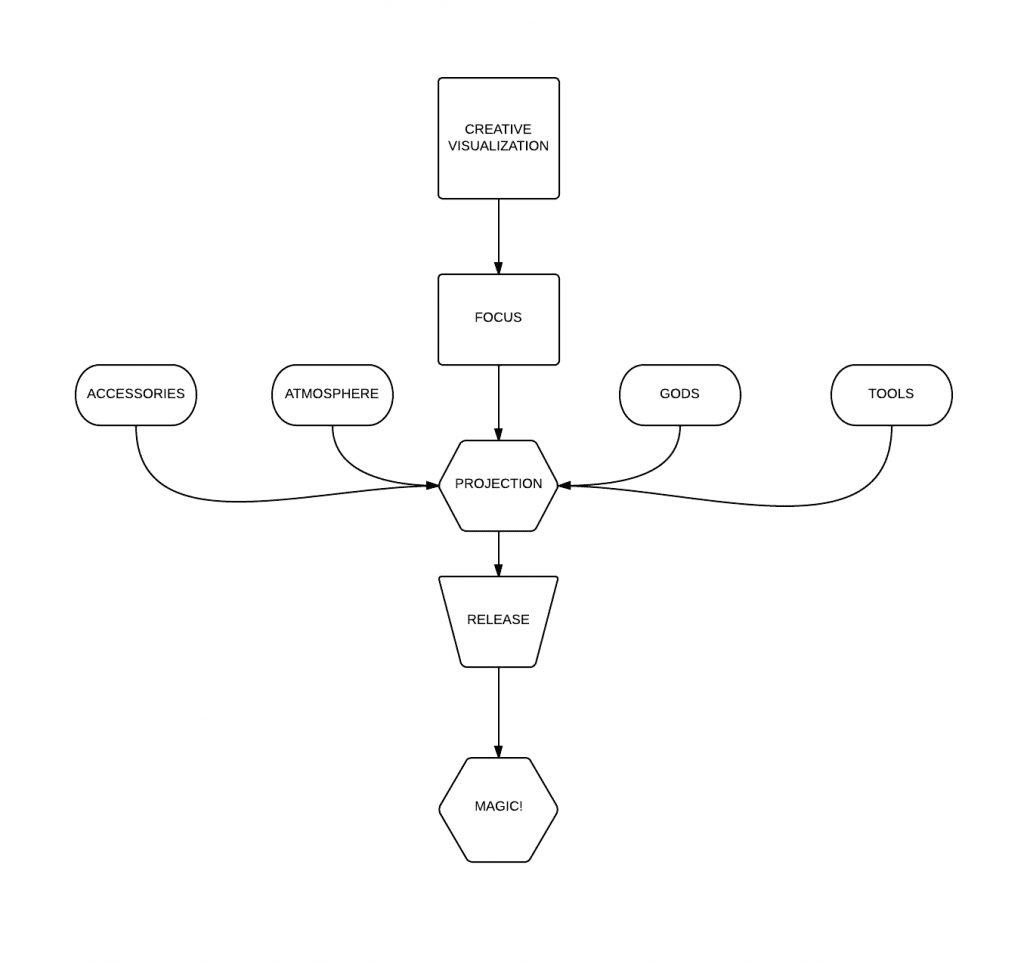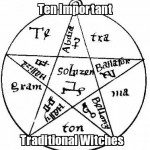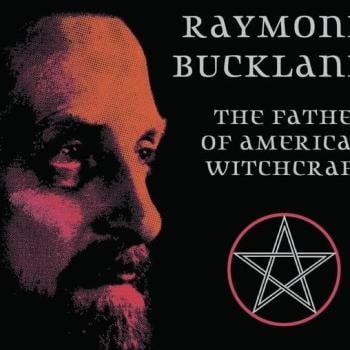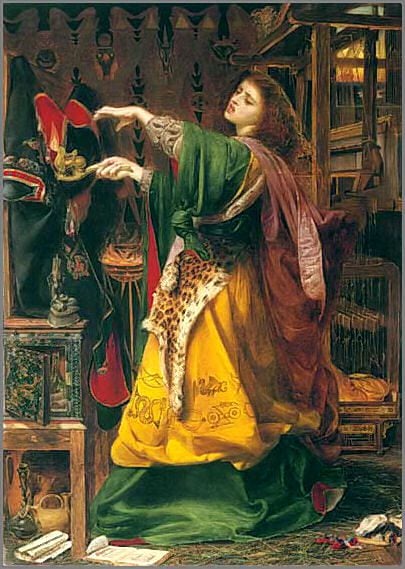 I have always been sort of ambivalent about spellwork. I’m a Pagan of the Witchy variety not because I’m an avid user of magic, but because it’s how I commune with the gods. The primary concern within my practice is about experiencing, feeling, and touching deity. Of secondary concern are seasonal rituals to connect with the Earth (which generally brings me closer to my gods) and fellowship with other Pagans. I don’t mean to trivialize the last two things here (they are important to me) but if I had not prayed to The Goddess and felt something twenty years ago this past July I wouldn’t be here. Paganism has so taken over my life that it’s become more than a spiritual pursuit. Its also my hobby so to speak. Researching the history of the occult certainly informs my practice, but my practice would survive without reading biographies of Paschal Beverly Randolph. Writing is sort of another hobby, but it’s also a weird sort of calling, and a part of my work (in several senses of that word). Paganism has given me everything, writing is how I give back.
I have always been sort of ambivalent about spellwork. I’m a Pagan of the Witchy variety not because I’m an avid user of magic, but because it’s how I commune with the gods. The primary concern within my practice is about experiencing, feeling, and touching deity. Of secondary concern are seasonal rituals to connect with the Earth (which generally brings me closer to my gods) and fellowship with other Pagans. I don’t mean to trivialize the last two things here (they are important to me) but if I had not prayed to The Goddess and felt something twenty years ago this past July I wouldn’t be here. Paganism has so taken over my life that it’s become more than a spiritual pursuit. Its also my hobby so to speak. Researching the history of the occult certainly informs my practice, but my practice would survive without reading biographies of Paschal Beverly Randolph. Writing is sort of another hobby, but it’s also a weird sort of calling, and a part of my work (in several senses of that word). Paganism has given me everything, writing is how I give back.
Magic is occasionally part of my practice, and I’ve always looked at it as a gift from the gods. In some religions all one can do is ask deity for assistance, my gods have given me the tools to change my circumstances. Magic is not an all powerful force, it doesn’t cure cancer* and it doesn’t bring money to people who sit on their ass all day. What magic does is grease the wheels so to speak, it’s the final push to put one over the top of an obstacle. Magic today is a subtle thing, I can’t use it to project a visible bolt of incapacitating energy. I wish that yelling “expelliarmus!” while holding onto my magic wand did tremendous things with very little effort. We all know that’s not the case. Magic generally works slowly, it has to travel out from its point of origin and then touch the things its meant to touch.
I use magic when I’ve hit a dead spot in my life. Recently my coven did some job-hunting spellwork. It wasn’t for me necessarily, but at the same time I knew that it provided a great opportunity for me to work on some things of a similar nature. I like writing this little blog, but it’s not all I want to do as a semi-professional Pagan. I really prefer teaching face to face and facilitating workshops on The Horned God, Drawing Down the Moon, and the little corners of history that so intrigue me. To get more opportunities to do such things I should probably also write a book of some consequence (even though I’m pretty sure that more people read this blog than would ever read a book written by me). So I worked on getting my ass in gear when it comes to writing. So far so good on all fronts, I even snagged one of those rare face to face teaching opportunities I love so much on the other side of the country. What is it magic that created that opportunity? Yes and no. I don’t get to teach by simply waiting for the phone to ring (or make little noises for texts), but magic is a way of sending my intentions out there. Perhaps someone wakes up and goes “Oh yeah, I love what the Raise the Horn guy writes.”
The most common definition of magic these days is probably Aleister Crowley’s:
“the Science and Art of causing Change to occur in conformity with Will.”
I’m OK with that definition, but it’s not the one I use in my own personal practice. For me magic is the “manipulation of natural energy towards a specific purpose.” I don’t think there’s anything all that magical about magic, it’s the energy that’s always around us, and by directing that energy at something or for something we make magic. In the case outlined above I directed that energy at my own tendency for sloth. I can’t do the things I want to do and get the opportunities that I would like by waiting. I need to write, I need to blog, I need to think, I need to create. Magic is the kick in the pants to do all of those things, and when I do all of those things stuff manifests in my life. I write something, someone sees that something, good things happen.
The most important part of the magical process is creative visualization. If one is incapable of seeing something they will probably be incapable of manifesting that something. In the spell I keep going back to I began the process by visualizing myself doing the things I want to happen in my life. I imagined typing on my computer, my face buried in Francis Barrett’s The Magus, working on lecture notes, teaching in public, and signing books somewhere. These were all very specific visualizations, but the one I most focused on was writing. None of the other stuff gets done without writing. In my visualizations I can see the office where I write, the morning coffee cup, the afternoon energy drink when things really get serious, the grime on my keyboard, etc. I think creative visualization works best when it’s specific.
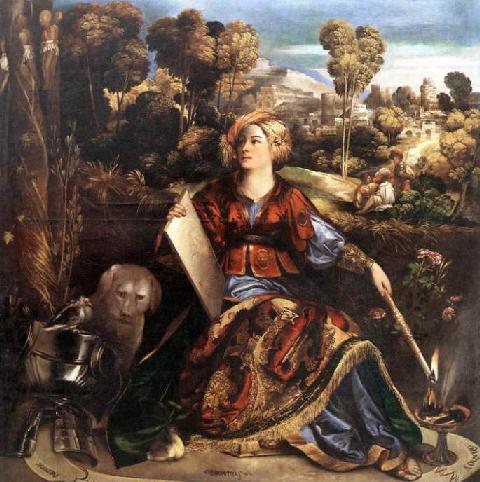 After visualization I focus on the intent of my spell. What are the end goals I’m trying achieve? Does the working I’m embarking upon violate someone else’s free will? (If the answer is yes the spell tends to be abandoned unless it’s about protection.) Magic is a very specific thing. I remember my first forays into magic and the many angsty “love spells” I used to cast. They all worked to some degree, but no one ever fell in love with me, it was always a one sided affair. Of course I barely even loved my self back then and as flawed as I was any sort of real relationship wasn’t even possible. For those spells to have worked I should have concentrated on being loving and loved and visualized happiness and personal wholeness. I didn’t understand any of those things until my wife Ari. Those completely lacked any sense of real focus or intent.
After visualization I focus on the intent of my spell. What are the end goals I’m trying achieve? Does the working I’m embarking upon violate someone else’s free will? (If the answer is yes the spell tends to be abandoned unless it’s about protection.) Magic is a very specific thing. I remember my first forays into magic and the many angsty “love spells” I used to cast. They all worked to some degree, but no one ever fell in love with me, it was always a one sided affair. Of course I barely even loved my self back then and as flawed as I was any sort of real relationship wasn’t even possible. For those spells to have worked I should have concentrated on being loving and loved and visualized happiness and personal wholeness. I didn’t understand any of those things until my wife Ari. Those completely lacked any sense of real focus or intent.
I used to have so many problems articulating my true desires in spellwork that I started to write everything I wanted to achieve down on a piece of paper or an index card. This was a very helpful process. In the “success spell scenario” I keep coming back to in this piece those intentions would have been written down like this:
~Write about Paganism and sometimes pop culture
~Promote that writing
~I’m capable of great work, do it.
~Opportunities from my work: books, speaking.
In the days leading up to the actual doing of the spell I continually think of my spell’s intent while visualizing it in my head. When I’m writing the words for the spell I go over my intent. While gathering up materials I go over my intent. When setting up my ritual room I go over my intent. It’s all about focus. If I’m not zeroed in on what I want to do it’s not going to get done. In addition when you one does a spell they often end up getting exactly what they asked for, which means having a very clear end goal is paramount.
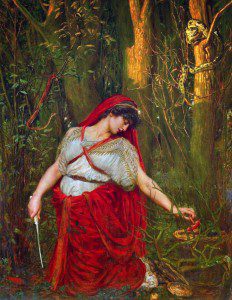 The climax of most spells is projection. That’s the moment when the spell is truly created. Often times that projection has some sort of hub or focal point. That could be an object like a candle or a mojo bag. Sometimes it’s a person, perhaps a High Priestess, or it might be a specific point or place. An altar in the center of a room could be such a place. What happens during projection is that all of the energies used to focus and visualize are given a space outside the body. When an object is used this is often called charging. Energy comes pouring out and is collected in a particular vessel or at a particular spot. It’s important to think about the things one wants to accomplish, but at some point those things have to move from the head to the rest of the body. I usually visualize the picture I have in my head going down through my neck, into my shoulders and arms, and then finally out from my fingertips. I take that ball of energy and push it out into the world or into a vessel being used for that purpose.
The climax of most spells is projection. That’s the moment when the spell is truly created. Often times that projection has some sort of hub or focal point. That could be an object like a candle or a mojo bag. Sometimes it’s a person, perhaps a High Priestess, or it might be a specific point or place. An altar in the center of a room could be such a place. What happens during projection is that all of the energies used to focus and visualize are given a space outside the body. When an object is used this is often called charging. Energy comes pouring out and is collected in a particular vessel or at a particular spot. It’s important to think about the things one wants to accomplish, but at some point those things have to move from the head to the rest of the body. I usually visualize the picture I have in my head going down through my neck, into my shoulders and arms, and then finally out from my fingertips. I take that ball of energy and push it out into the world or into a vessel being used for that purpose.
Since the projection stage is critical it’s also when all the spell’s extra accoutrements come into play. A lot of spells call for accessories, things like rocks, crystals, herbs, candles, etc. Everything has energy and everything radiates energy, so when somebody makes a particular gemstone a part of a magical working they are adding energy to the spell. Plants and herbs sometimes do the same thing. A candle might serve as both a focal point and an accessory. Carving runes into a candle is a focused action, but the runes themselves also have energy, adding to the spell. The color red has an energy of desire and will, it’s another way to add to the energy being gathered. A lot of people swear by the moon and stars in their spellwork, with the idea that certain times and circumstances make for better magic. I agree, much like anything else (and perhaps more than anything else) those bodies release energy. A waxing moon is going to add an extra bit of oomph for a prosperity spell, but doing that same spell when the moon is waning won’t necessarily doom it to failure.
Atmosphere is important in most every ritual and magical working. An uncomfortable environment can work against a spell. If I was doing doing my spellwork outdoors and felt as is a neighbor was spying on me the whole time my spell is probably going to be less successful. My focus would have shifted to the neighbor and away from the working. Sometimes spells have to be cast in less than ideal locations, but the more that location distracts, the less effective the work is going to be.
I feel most Witch-like in candlelight with the scent of incense around me and things work better when the atmosphere around me is conductive to what I’m doing. My tools are another part of this. Tools are not required for ritual, but they do help me project my energy more efficiently, and some of them even have their own residual energies that can add to a spell. I have certain candle holders that I’ve used for almost two decades now, they certainly have their own energy at this point. Something as mundane as my altar table is full of juice. It’s not all that pretty and my wife often talks about getting a new one, but it has its own sort of presence to it. I think things simply being close to my athame get a little extra jolt of electricity. Even if one is working alone speaking out loud projects powerful energy. Words are tools, saying things out-loud is good magic.
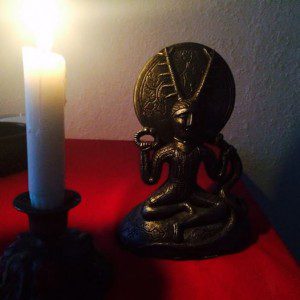 I don’t think magic is necessarily religious, and magic often just exists side by side with religion, they aren’t one and the same. One can work magic with no gods at all, or one can work with and beside them. Often times my wife invokes her deities and then does magical work with almost no conscious thought. In those cases she’s focused on her intent and certainly visualized it, but the gathering of things, the words that come out of her mouth, it all comes from somewhere else. Even the actual process of projecting energy and finishing up the spell comes from someplace else. My gods don’t always work in the same way, but their very presence often adds an extra layer to my spell work. People generally think of Cernunnos as a god of hunting, but he was often surrounded by coins. When I do a work or money spell I generally invite him to the proceedings. He has a certain energy that adds to those sort of spells. Aphrodite being around for a love spell adds to an environment projecting the idea of love. Gods are good to have around when doing spells if they like what’s going on. I wouldn’t invite Pan to a spell for monogamy for example, he’d probably try to wreck it since that’s not how he likes to operate.
I don’t think magic is necessarily religious, and magic often just exists side by side with religion, they aren’t one and the same. One can work magic with no gods at all, or one can work with and beside them. Often times my wife invokes her deities and then does magical work with almost no conscious thought. In those cases she’s focused on her intent and certainly visualized it, but the gathering of things, the words that come out of her mouth, it all comes from somewhere else. Even the actual process of projecting energy and finishing up the spell comes from someplace else. My gods don’t always work in the same way, but their very presence often adds an extra layer to my spell work. People generally think of Cernunnos as a god of hunting, but he was often surrounded by coins. When I do a work or money spell I generally invite him to the proceedings. He has a certain energy that adds to those sort of spells. Aphrodite being around for a love spell adds to an environment projecting the idea of love. Gods are good to have around when doing spells if they like what’s going on. I wouldn’t invite Pan to a spell for monogamy for example, he’d probably try to wreck it since that’s not how he likes to operate.
There are various ways to project and create energy. Some dance, some sing, some chant; almost everything we do creates a certain amount of energy, the key is to project that energy towards a specific purpose or place. When my coven dances and chants to raise energy my wife usually gathers all that energy and focuses it on our working. She holds it in the center of the circle, directs it towards our chosen intention, and then releases it to do that work. When a spell is really going and things are moving in the right direction it can sometimes be often physically “felt.” In my experience the air is heavy, there’s a tingle I can feel, my vision might swim just a little bit, and I might very well feel transformed in the moments before a spell is released upon the world.
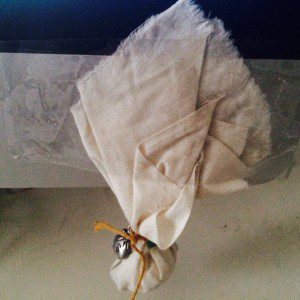 Release is the right word to use here too, because that’s what happens at the end of a spell. All the energy spent working towards a specific goal is now going out into the world; it’s free to go where it’s needed. Sometimes that release is fast and immediate, like after a spiral dance or a chant. Other times it moves more slowly. At my coven’s recent jobs spell we put our magic into bags and as a result the spell’s energy moves slowly, it wasn’t designed for immediate transformation. In my case it’s now taped to my computer reminding me to do what I should be doing, and when things aren’t going quite right I touch it to give myself a little bit of its energy to get me back on track. When I use candles in spellwork I sometimes burn them over a course of days (weeks!) and every time I relight those candles I send out more energy for my chosen purpose.
Release is the right word to use here too, because that’s what happens at the end of a spell. All the energy spent working towards a specific goal is now going out into the world; it’s free to go where it’s needed. Sometimes that release is fast and immediate, like after a spiral dance or a chant. Other times it moves more slowly. At my coven’s recent jobs spell we put our magic into bags and as a result the spell’s energy moves slowly, it wasn’t designed for immediate transformation. In my case it’s now taped to my computer reminding me to do what I should be doing, and when things aren’t going quite right I touch it to give myself a little bit of its energy to get me back on track. When I use candles in spellwork I sometimes burn them over a course of days (weeks!) and every time I relight those candles I send out more energy for my chosen purpose.
Magic requires imagination, the first step is seeing one’s self doing the things that make life better. That’s followed by focus, zeroing in on those things and being specific about them. Eventually focus and visualization are projected outside of the body so ideas can be realized. Often times that projection is aided by deity, other magical tools or implements, and the environment from which the spell is cast. At the end a spell is about releasing that energy for positive change. If my will never leaves my living room I will never leave my living room.
So mote it be.
*I do believe magic can make people who are sick feel better and perhaps even energize the body. Giving someone healing energy might also prolong a life, but I don’t believe it’s capable of “curing” certain ailments.


